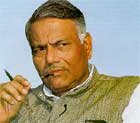|
|
|
|
|
| HOME | BUSINESS | COMMENTARY | DILIP THAKORE | |||
|
February 16, 2000
NEWSLINKS
|
Business Commentary/Dilip ThakoreGo for the old economic guard's jugular, Mr FM At 12 noon on February 29, Union Finance Minister Yashwant Sinha will rise in the Lok Sabha to present the NDA government’s second Union Budget since the coalition 23-party government was returned to power.
At 12 noon on February 29, Union Finance Minister Yashwant Sinha will rise in the Lok Sabha to present the NDA government’s second Union Budget since the coalition 23-party government was returned to power.
The first Union Budget of the new millennium offers the finance minister a unique opportunity to break with the economic development policies of the past which, though professedly socialistic, have reduced the population of this resource-rich and potentially prosperous nation to the bottom decile of the world’s poorest and most illiterate societies.
The budget provides estimates of the Union government’s revenue generation and expenditure proposals for the forthcoming year -- in this case for the fiscal year ending March 31, 2001. Consequently, it is a truly millennial budget transcending the controversy whether the new millennium begins in the year 2000 or 2001. Therefore, it offers Sinha a unique, never-before opportunity to present a budget which is not merely a rendition of annual accounts but a visionary statement of intent which signals a radical break with the failed economic development policies of the past. This is the time to make a determined effort to lift the Indian economy out of the self-made rut in which it has been mired for the past half century, set it on the high growth path by integrating it with the rest of the world. The reason why the budget presentation generates great trepidation and excitement is that in post-Independence India, the government has extended the ambit of its activities to cover almost every sector of the economy. Therefore, its tax and spend proposals have the potential to radically alter the lives, the future and well-being of millions of corporate and business enterprises and hundreds of millions of citizens. In socialist, post-Independence India, the Union government is not only the national administrator, it is the dominant business conglomerate, the largest employer and the largest provider of health and education services as also the dispenser of subsidies to ‘deserving’segments of the population. Therefore, how it proposes to raise the finance required for its much-too-many activities and how it proposes to spend the money thus mobilised, is a matter of vital importance to the citizen. And if in spite of the government being all pervasive for the past half-century, India is still one of the world’s most illiterate and poorest nations, it is self-evident that the government-dominated economic development model is a failure. Therefore, the first requirement of a new millennium budget is the downsizing of government and its withdrawal from several segments of the economy. Quite obviously, the first segment of the economy from which the Union government needs to begin to withdraw is industry and commerce. There is now a national consensus that government needs to get out of business and industry and that the business of government is governance and not commerce. Largely as a consequence of successive governments in New Delhi having invested over Rs 2 trillion (1,000 million = 1 billion; 1,000 billion = 1 trillion) in over 150 non-performing public sector enterprises, the Union government’s fiscal deficit (total expenditure minus revenue) in the year ending March 31, 2000 is budgeted at Rs 1.04 trillion. And the major contributory cause of the fiscal deficit having run out of control is that the Union government’s annual interest payment bill has risen to over Rs 900 billion. If the PSEs had been well-managed, the government would not have had to resort to such heavy borrowing which has made the nation technically bankrupt. Therefore, quite obviously, government has to get out of business by selling its assets and retiring its debt to reduce the crushing burden of annual interest payments. Consequently, citizens must judge the forthcoming budget on the basis of its seriousness relating to the genuine privatisation of PSEs and the deployment of the proceeds of privatisation. But though interest payments is the largest annual head of expenditure of the Union government,‘non-merit’ subsidies are another equally large head of expenditure. These include broad-spectrum subsidies on fertiliser, food, water, electricity, transport and higher education which are provided to all and sundry. One yardstick of a good budget is its seriousness of intent to begin the process of phasing out and/or targeting non-merit subsidies which are estimated at 15 per cent of the GDP (Rs 3 trillion) per year. Of course, this means that government servants have to do a lot of work to rationalise subsidies and to carefully identify needy target groups which must be protected. But it is high time Central government employees who cost tax-payers a cool Rs 400 billion per year, began to earn their pay.
Unfortunately, the annual budget presentation ceremony also offers myriad opportunities to finance ministers to obfuscate core issues and to confuse the people. But by focussing upon these core issues, citizens can judge whether the forthcoming budget is a truly millennium presentation to the long-suffering citizenry or just government business as usual.
Run-up to the Budget 2000-2001
|
|
Tell us what you think of this column
|
|
|
HOME |
NEWS |
BUSINESS |
MONEY |
SPORTS |
MOVIES |
CHAT |
INFOTECH |
TRAVEL SINGLES | NEWSLINKS | BOOK SHOP | MUSIC SHOP | GIFT SHOP | HOTEL BOOKINGS AIR/RAIL | WEATHER | MILLENNIUM | BROADBAND | E-CARDS | EDUCATION HOMEPAGES | FREE EMAIL | CONTESTS | FEEDBACK |
|